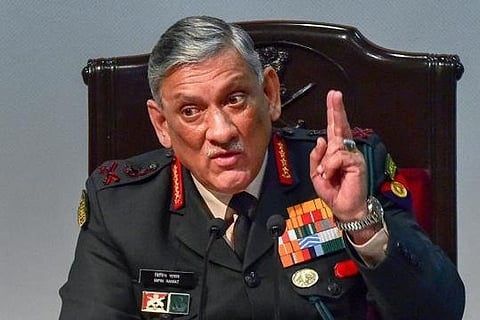

New Delhi
The highly decorated four-star General of the Indian Army was the first Chief of Defence Staff of India, a profile that had not existed until December 31, 2019 when he was appointed to this office, which was aimed at improving coordination between the three Armed Forces - i.e. the Indian Army, Navy and Air Force.
His departure has left a major void that the Indian administration is faced with. A rundown of the profiles handled by Rawat may offer insight into the quantum of the loss.
In his role as the CDS, Rawat was a member of the Nuclear Command Authority headed by Prime Minister Narendra Modi. The responsibilities of the CDS include acting as the Principal Military Adviser to the Defence Minister on all matters of supreme importance to the Armed Forces of the nation.
Apart from being a member of the Defence Acquisition Council and the Defence Planning Committee, Rawat also commanded the Armed Forces in matters pertaining to the Cyber and Space verticals.
Perhaps, more significantly, Rawat was recently involved in drawing up a new Integrated Capability Development Plan or ICDP. The idea was said to lay the groundwork for procurement plans for the Armed Forces. This review of the ICDP would have implications for the long-term procurement plans of the forces.
Military profiles aside, Rawat represented the shift to a highly reformative, and transformative approach to the way India saw its Armed Forces.
In the time-honoured military tradition, which always stood out thanks to its apolitical bent of mind, Rawat’s insistence on engaging with the media and pointing out the impact of both internal and external threats was a stark change from the measured rhetoric and at times stoic silence of the Chiefs of the Staffs until this point in time.
Rawat had been especially vocal on China and Pakistan, for inciting unrest on the borders. He had also called out China for its tendency to use monetary incentives and economics to gain the trust of nations.
As far as India was concerned, the ICDP initiative was ground-breaking to say the least, as the review by the CDS was clearly intended to break down all possible bottlenecks, bureaucratic and otherwise, as the Armed Forces worked within their own protocols when it came to defence procurement.
Unifying the defence procurement is beneficial not just because it is cost-effective, but also because it would focus more on building synergies within the military and advancing its capabilities as opposed to just boasting of numbers.
This is especially relevant when one considers that India’s 15-year Long Term Integrated Perspective Plans (LTIPP) which has been touted as being one off the touchstones of the country’s military modernisation programme was a short-sighted, on-paper drive that had no connection with the nation’s actual annual capital spends on the military.
It may be recalled that India’s capital budget allocation for the Armed Forces for the year 2021-22 is lower than the quantum sought in 2014-15, which underscores the importance of rightful spends. And that was exactly Rawat’s forte - getting the forces together and figuring out the technologies and areas where spends needed to be directed.
Rawat’s untimely death has undoubtedly cast a shadow on many such military priorities of India, which is constantly under the shadow of hostility from two nuclear-armed adversaries. His successor will have big shoes to fill — and not much time to play catch-up in this crucial role that involves the safety, security and protection of the nation.
Visit news.dtnext.in to explore our interactive epaper!
Download the DT Next app for more exciting features!
Click here for iOS
Click here for Android